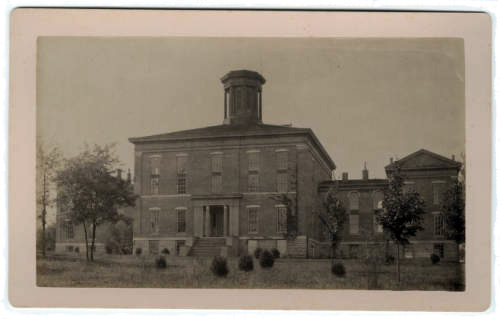
Solon H. Lathrop,
letter to
Orson H. Hart and the Freedmen's Bureau
Sept. 20, 1865

Transcription of a letter available in the Freedmen's Bureau Digital Collection at the National Museum of African American History and Culture (part of the "Registers and Letters Received by the Commissioner of the Bureau of Refugees, Freedmen, and Abandoned
Lands, 1865-1872" collection).
Solon H. Lathrop wrote this
letter to Orson H. Hart; they were both on the staff of Gen. E. O. C.
Ord, who was an assistant commissioner of the Freedmen's Bureau.
Lathrop was tasked with investigating conditions in southern Indiana just
after the Civil War; here, he describes the town
of Hanover, giving
us an unusually clear picture of the College's African-American
neighbors at that time. (The U.S. censuses for
1860 and 1870 show how much the African-American population increased
after the war. There were 64 African Americans living in Hanover
in 1860, and 232 by 1870.)
We are grateful to Molly Mersmann
(HC 2015) for discovering this letter and sharing it with us.

Head Qrs. Dept of the
Ohio,
Inspt. General's Office
Detroit, Mich. September 20, 1865
Inspt. General's Office
Detroit, Mich. September 20, 1865
Colonel:
I have the honor to
report, that when in Madison, Ind. on the 15th, it was reported to me,
by what I deemed good authority, that "at least (750) seven hundred and
fifty Freedmen were scattered through the country," some six miles from
the town, that they were living "in crowded houses, many without
shelter, that they were sick, destitute, and in a deplorable condition."
The representations were so strong, that I deemed it my duty to visit
the neighborhood, and ascertain the facts.
I arrived at Hanover, a
town of some three or four hundred inhabitants, the center of the
neighborhood named on the 15th inst., and obtained such information as I
could of the principal men in the village, and at once made up my mind
that the reports were greatly exaggerated. I visited several of the
buildings occupied by the colored people, and found them quite as
comfortable, and not more crowded than buildings occupied by the foreign
laboring people in any cities. All the men were at work at good wages,
several of them getting two dollars a day. The women, if able to go out
to work, could find good places at high wages, if not able to go out,
having children to take care of, they got washing at from seventy five
cents to a dollar a dozen.
The most crowded house I
found, contained twenty-five persons, four men, during the day absent at
work, six women, four of them wives of the men, and two, whose husbands
were in the army, and fifteen children; the children were all small; any
children over six years, can readily find a place, and make their
living. This house contained two large rooms, the cooking being done out
doors. Children and adults were healthy. The women all told me they had
plenty to eat, were very comfortable and contented. I did not see a
single case of suffering, or hear a complaint. The principal persons of
the village informed me that they had never known a case of theft, or a
single instance of begging. Instead of there being seven hundred and
fifty, as represented, there were not two hundred of all ages and sexes.
It may not be improper
to add that the town of Hanover, is situated in a fine agricultural
region, settled by wealthy farmers, where there is always a demand for
labor, - - it also contains a college known as "Hanover College," the
boarding houses and washing for students requiring a larger amount of
"female help" than most towns of this size. I am confident that if there
were double the number of colored people at this place, they could find
employment. It was intimated, when winter came on, that the people would
not be as comfortable as now. This is quite likely, but the same class,
of people, if work is not to be obtained, are not comfortable any where.
They are quite as likely to get work here as any place I know of, and I
am satisfied the people residing here will not permit any great amount
of suffering.
Respectfully submitted,
S.H. Lathrop
Bt. Col. US Vol
AA Inspector General
Bt. Col. US Vol
AA Inspector General


Hanover College, about 1870


Return to Hanover College Department of History
Please send comments to: historians@hanover.edu
